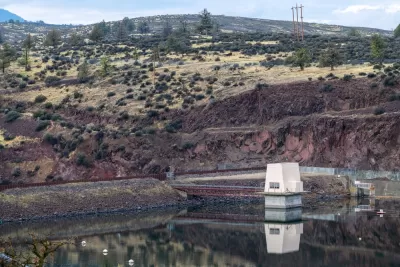Four dams are coming down along the Klamath River. The final decision to remove the dams is a milestone political and legal victory for indigenous tribes living in Southern Oregon and Northern California.

The largest dam removal project in U.S. history has cleared its final hurdle on the Klamath River in Oregon and California. The Iron Gate Dam, J.C. Boyle Dam, and Copco dams #1 and #2 will soon be history.
“The Federal Energy Regulatory Commission voted Thursday to allow the license of four dams on the Klamath River to lapse,” reports Kurtis Alexander for the San Francisco Chronicle [paywall] to report the historic news.
“The vote by federal regulators opens the door for the first of the four hydroelectric dams to come down next year in what has been a two-decade effort to liberate the once mighty river that spans southern Oregon and Northern California,” adds Alexander.
Additional coverage of the news is available from the Associated Press and High County News.
“After a grueling 20 years of environmental impact statements, scientific studies, negotiations with stakeholders and advocacy from the tribes and their conservationist allies — people who, as Hoopa Valley Tribe Chairman Joe Davis said, ‘poured their blood, sweat and tears into making this happen’ — the vote is the final green light everyone’s been waiting for. With FERC’s laborious approval process now concluded, dam removal can begin, launching what is expected to be the biggest river restoration project in U.S. history,” reports B. ‘Toastie’ Oaster for High Country News.
Oaster provides additional about the remaining steps in the dam removal process: “The next legal steps are largely technical. As a result of the vote, FERC is ordering the surrender of the Lower Klamath Project License, which is currently held by energy company PacifiCorp. That license will be transferred to the entities in charge of dam removal: the states of Oregon and California, and the Klamath River Renewal Corporation, a nonprofit created to oversee dam removal that is made up of tribal, state and conservation group representatives.”
As noted by Oaster, the stage for FERC’s historic vote was set by FERC’s August release of a final environmental impact statement.
Planetizen has been covering the Klamath River dam saga since 2007, with updates oscillating between progress and setbacks for the dam removal in 2008, 2016 (and 2016 again), 2018, and 2022. The Klamath River made national news in 2002 when a fish kill left 34,000 dead salmon lining the banks of the river.
More details on what’s next in the dam removal process are included at the link below.
FULL STORY: The Klamath dams are coming down

Maui's Vacation Rental Debate Turns Ugly
Verbal attacks, misinformation campaigns and fistfights plague a high-stakes debate to convert thousands of vacation rentals into long-term housing.

Planetizen Federal Action Tracker
A weekly monitor of how Trump’s orders and actions are impacting planners and planning in America.

In Urban Planning, AI Prompting Could be the New Design Thinking
Creativity has long been key to great urban design. What if we see AI as our new creative partner?

King County Supportive Housing Program Offers Hope for Unhoused Residents
The county is taking a ‘Housing First’ approach that prioritizes getting people into housing, then offering wraparound supportive services.

Researchers Use AI to Get Clearer Picture of US Housing
Analysts are using artificial intelligence to supercharge their research by allowing them to comb through data faster. Though these AI tools can be error prone, they save time and housing researchers are optimistic about the future.

Making Shared Micromobility More Inclusive
Cities and shared mobility system operators can do more to include people with disabilities in planning and operations, per a new report.
Urban Design for Planners 1: Software Tools
This six-course series explores essential urban design concepts using open source software and equips planners with the tools they need to participate fully in the urban design process.
Planning for Universal Design
Learn the tools for implementing Universal Design in planning regulations.
planning NEXT
Appalachian Highlands Housing Partners
Mpact (founded as Rail~Volution)
City of Camden Redevelopment Agency
City of Astoria
City of Portland
City of Laramie



























